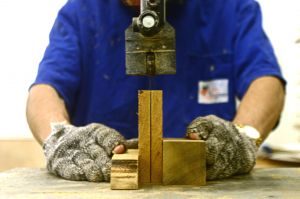In Capital Builders Hardware v. WCAB, a case from the California Court of Appeals, Second Appellant District, claimant was injured in an industrial accident while working for his employer, which is a major construction company. While the court opinion does not specify how he was injured or the type of injury he sustained, we do know that he filed for workers’ compensation following his injury.
 After filing his workers’ compensation claim, his employer, through its workers’ compensation insurance company representative, filed a motion to exclude the admission of a particular medical report into the record in this case. The administrative judge at the workers’ compensation commission denied the employer’s request to exclude the medical report and indicated that his dismissal was without prejudice.
After filing his workers’ compensation claim, his employer, through its workers’ compensation insurance company representative, filed a motion to exclude the admission of a particular medical report into the record in this case. The administrative judge at the workers’ compensation commission denied the employer’s request to exclude the medical report and indicated that his dismissal was without prejudice.
The terms “with prejudice” and “without prejudice” have very different meanings in the legal context than they do in ordinary conversation, as you can discuss with your Boston workers’ compensation attorney. In this context, we are talking about legal prejudice or harm to the case of the non-moving party. For example, if a case is dismissed without prejudice, this means that the dismissal is not necessarily permanent. While it is mostly likely going to be treated as a closed matter, the other side is not prejudiced with finality, so they can revive the issue upon filing a motion and good cause shown. In other words, a case dismissed without prejudice can be reopened if the other party can show that there is a good and just reason to reopen the case. Alternatively, if a judge grants or denies a motion with prejudice, it is treated as final decision on the matter.
In this case, the employer appealed the decision of the workers’ compensation judge to deny their motion, since the denial was without prejudice to the workers’ compensation commission appeals board for the state. The appeals board has discretion on which cases it will review and denied the petition to rehear this issue.
At this point, the employer appealed to the state court of appeals via the filing of a writ. On appeal, the court held that the appeals board decision to deny the appeal was not proper, since the issues was not ripe for review at that point anyway. Even though the denial of employer’s motion was done without prejudice, it was not a final order in the case. The court of appeals held that the case must continue before the workers’ compensation judge and then, once a final decision has been rendered and that final decision has been reduced to a final order, that order can be appealed. However, there cannot be an appeal before this happens.
If the court were to allow an earlier appeal while the case was still pending, that would be known as an interlocutory appeal. While there are some cases where an interlocutory appeal is appropriate, these cases are few and far between, and it is normal for an appellate court to deny a court order until such time as an appeal is ripe for review, to use the term applied to these situations.
If you or someone you love has been injured a Boston work accident, call for a free and confidential appointment at (617) 777-7777.
Additional Resources:
Capital Builders Hardware v. WCAB, November 16, 2016, California Court of Appeal
More Blog Entries:
Parr v. Breeden – Supervisor Co-Workers Not Liable Under Workers’ Comp Exclusive Remedy, July 3, 2016, Boston Work Accident Lawyer Blog
 Massachusetts Workers Compensation Lawyers Blog
Massachusetts Workers Compensation Lawyers Blog

